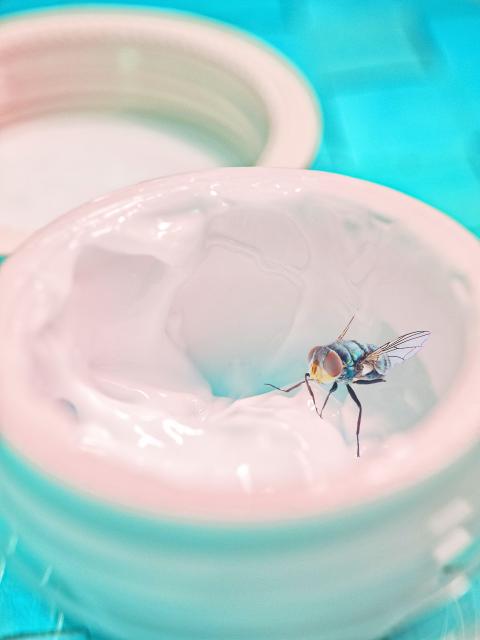Chinese practice
美中不足
one slight blemish

Photo: Paul Cooper, Taipei Times
照片:台北時報記者古德謙攝
in an otherwise perfect thing
(mei3 zhong1 bu4 zu2)
成語「美中不足」意指雖然某事物很美,但仍有缺點。這句話出自明朝劇作家吾丘瑞的《運甓記》,書中寫的是晉朝名將及名官陶侃(西元二五九到三三四年)由貧至富之故事。
在故事中,陶侃夢見自己生出八隻翅膀,飛上了天,看見神秘的九道門。他飛過了八道門,但飛不過第九道,而被守門人擋下了,守門人打落了他左邊的一隻翅膀。陶侃夢醒後,覺得腋下疼痛,便找人來告訴他這夢是吉是凶。
中國原本被劃分為九個州。解夢人說,飛越八道門意為陶侃以後將會鎮守八州;最後一道門代表有一州是他永遠無法掌握的。被打斷的翅膀指的是一個缺陷,是阻礙他的一個部分。
在英語中有一個片語a fly in the ointment(油膏裡的蒼蠅),看似相同,但在意思上有細微的差異。油膏原本是用在宗教的膏抹儀式。在詹姆士王欽定版聖經傳道書第十章第一節提到,「死蒼蠅使作香的膏油發出臭氣;這樣,一點愚昧也能敗壞智慧和尊榮。」
這句話或許應再多做解釋。Apothecary是藥局的古字;doth是does一字的古寫法;folly意為不智之舉。換句話說,一個小過失即可傷害人,即便這人在其他方面有著明智與可敬的聲譽。在現今的用法中,the fly in the ointment 意指一個小細節便毀了全部,一顆老鼠屎壞了一鍋粥。而「美中不足」則指事物雖整體上可接受,但略有瑕疵,與a fly in the ointment 稍有不同。
(台北時報編譯林俐凱譯)
這房子依山傍水美極了,但美中不足的是離上班的地方太遠了。
(This apartment is close to the mountains and looks out over a river. It’s really beautiful, but the fly in the ointment is that it is too far from work.)
英文練習
A (the) fly in the ointment
The Chinese proverb 美中不足 means that, although an object is beautiful, it nevertheless does contain a flaw. The phrase appeared in the book Moving Bricks, or yun pi ji, by the Ming dynasty author Wu Qiurui, in which he relates how the renowned Jin dynasty general and governor Tao Kan (259–334 AD) went from poverty to fabulous wealth.
In the book, Tao Kan dreams he has sprouted eight wings, and flies up to the heavens where he sees the mythical nine Heavenly Gates. He flies through eight of them, but cannot pass through the ninth, and is struck down by the guardian, who breaks off one of the wings on his left side. On waking, he feels a pain in his armpit, and he goes to find someone who can tell him whether the dream was auspicious or not.
China was originally divided into nine provinces. The dream interpreter said that flying through eight of the gates means that he would later be put in charge of eight; the last gate represented the province that he would never control. The wing that was struck off referred to a flaw, one aspect of him that held him back.
There is a phrase in English: “a fly in the ointment,” which although appears similar, is actually subtly different in meaning. Ointment was originally a preparation that would be used to anoint people with. The King James Version of the Bible, Ecclesiastes 10:1, says, “Dead flies cause the ointment of the apothecary to send forth a stinking savour: so doth a little folly him that is in reputation for wisdom and honour.”
That sentence perhaps requires a little explanation. “Apothecary” is an old word for pharmacy; “doth” is an archaic rendering of “does”; “folly” means an unwise act. In other words, one tiny misstep can harm a person, even if that person otherwise had a reputation for being wise and honorable.
In modern usage, “a fly in the ointment” means an apparently insignificant detail that spoils the whole, whereas 美中不足 usually refers to a thing or situation that, while imperfect in some way, is still acceptable and not totally spoilt. (Paul Cooper, Taipei Times)
I’m really looking forward to our trip, but the fly in the ointment is that I’ll have to take a conference call on the second day.
(真的好期待我們的旅行。可惜的是,行程第二天我得要接一個會議電話。)

In an effort to fight phone scams, British mobile phone company O2 has introduced Daisy, an AI designed to engage phone con artists in time-wasting conversations. Daisy is portrayed as a kindly British granny, exploiting scammers’ tendency to target the elderly. Her voice, based on a real grandmother’s for authenticity, adds to her credibility in the role. “O2” has distributed several dedicated phone numbers online to direct scammers to Daisy instead of actual customers. When Daisy receives a call, she translates the scammers’ spoken words into text and then responds to them accordingly through a text-to-speech system. Remarkably, Daisy

Bilingual Story is a fictionalized account. 雙語故事部分內容純屬虛構。 Emma had reviewed 41 resumes that morning. While the ATS screened out 288 unqualified, she screened for AI slop. She could spot it a mile away. She muttered AI buzzwords like curses under her breath. “Team player.” “Results-driven.” “Stakeholder alignment.” “Leveraging core competencies.” Each resume reeked of AI modeling: a cemetery of cliches, tombstones of personality. AI wasn’t just changing hiring. It was draining the humanity from it. Then she found it: a plain PDF cover letter. No template. No design flourishes. The first line read: “I once tried to automate my

Every May 1, Hawaii comes alive with Lei Day, a festival celebrating the rich culture and spirit of the islands. Initiated in 1927 by the poet Don Blanding, Lei Day began as a tribute to the Hawaiian custom of making and wearing leis. The idea was quickly adopted and officially recognized as a holiday in 1929, and leis have since become a symbol of local pride and cultural preservation. In Hawaiian culture, leis are more than decorative garlands made from flowers, shells or feathers. For Hawaiians, giving a lei is as natural as saying “aloha.” It shows love and

1. 他走出門,左右看一下,就過了馬路。 ˇ He walked outside, looked left and right, and crossed the road. χ He walked outside and looked left and right, crossed the road. 註︰並列連接詞 and 在這句中連接三個述語。一般的結構是 x, y, and z。x and y and z 是加強語氣的結構,x and y, z 則不可以。 2. 他們知道自己的弱點以及如何趕上其他競爭者。 ˇ They saw where their weak points lay and how they could catch up with the other competitors. χ They saw where their weak points lay and how to catch up with the other competitors. 註:and 一般連接同等成分,結構相等的單詞、片語或子句。誤句中 and 的前面是子句,後面是不定詞片語,不能用 and 連接,必須把不定詞片語改為子句,and 前後的結構才相等。 3. 她坐上計程車,直接到機場。 ˇ She took a cab, which took her straight to the airport. ˇ She took a cab and it took her straight